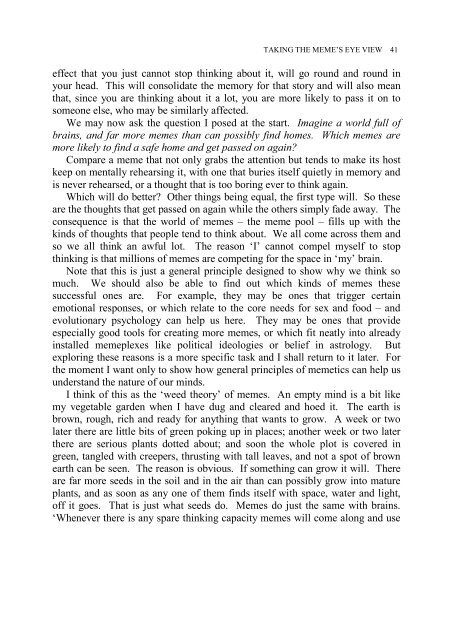The Meme Machine
TheMemeMachine1999
TheMemeMachine1999
- No tags were found...
You also want an ePaper? Increase the reach of your titles
YUMPU automatically turns print PDFs into web optimized ePapers that Google loves.
TAKING THE MEME’S EYE VIEW 41<br />
effect that you just cannot stop thinking about it, will go round and round in<br />
your head. This will consolidate the memory for that story and will also mean<br />
that, since you are thinking about it a lot, you are more likely to pass it on to<br />
someone else, who may be similarly affected.<br />
We may now ask the question I posed at the start. Imagine a world full of<br />
brains, and far more memes than can possibly find homes. Which memes are<br />
more likely to find a safe home and get passed on again?<br />
Compare a meme that not only grabs the attention but tends to make its host<br />
keep on mentally rehearsing it, with one that buries itself quietly in memory and<br />
is never rehearsed, or a thought that is too boring ever to think again.<br />
Which will do better? Other things being equal, the first type will. So these<br />
are the thoughts that get passed on again while the others simply fade away. <strong>The</strong><br />
consequence is that the world of memes – the meme pool – fills up with the<br />
kinds of thoughts that people tend to think about. We all come across them and<br />
so we all think an awful lot. <strong>The</strong> reason ‘I’ cannot compel myself to stop<br />
thinking is that millions of memes are competing for the space in ‘my’ brain.<br />
Note that this is just a general principle designed to show why we think so<br />
much. We should also be able to find out which kinds of memes these<br />
successful ones are. For example, they may be ones that trigger certain<br />
emotional responses, or which relate to the core needs for sex and food – and<br />
evolutionary psychology can help us here. <strong>The</strong>y may be ones that provide<br />
especially good tools for creating more memes, or which fit neatly into already<br />
installed memeplexes like political ideologies or belief in astrology. But<br />
exploring these reasons is a more specific task and I shall return to it later. For<br />
the moment I want only to show how general principles of memetics can help us<br />
understand the nature of our minds.<br />
I think of this as the ‘weed theory’ of memes. An empty mind is a bit like<br />
my vegetable garden when I have dug and cleared and hoed it. <strong>The</strong> earth is<br />
brown, rough, rich and ready for anything that wants to grow. A week or two<br />
later there are little bits of green poking up in places; another week or two later<br />
there are serious plants dotted about; and soon the whole plot is covered in<br />
green, tangled with creepers, thrusting with tall leaves, and not a spot of brown<br />
earth can be seen. <strong>The</strong> reason is obvious. If something can grow it will. <strong>The</strong>re<br />
are far more seeds in the soil and in the air than can possibly grow into mature<br />
plants, and as soon as any one of them finds itself with space, water and light,<br />
off it goes. That is just what seeds do. <strong>Meme</strong>s do just the same with brains.<br />
‘Whenever there is any spare thinking capacity memes will come along and use



